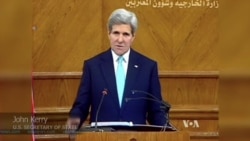Muslims of all ages are being allowed to worship Friday at the Temple Mount; the Jerusalem holy site that Muslims call al-Aqsa mosque.
Israel restricted worship at the mosque recently to women and men 35 and older, fearing youths would stir up violence.
Israeli police spokesman Mickey Rosenfeld said Israel is "hoping things will be calm and quiet today."
Rosenfeld said extra police units have been deployed in Jerusalem to prevent any incidents in and around the Old City where the Temple Mount is located.
Also adding to the recent outbreak of violence are new Israeli settlements on occupied territory.
Under a long-standing agreement, Jews can visit the Temple Mount, but not openly pray there, to avoid offending Arabs. Some Jews have been pushing for an expansion of the right to worship at the site.
Earlier this month, a Palestinian gunman seriously wounded a U.S.-born rabbi after a conference on greater rights at the Temple Mount. Israeli police shot and killed the gunman.
Earlier, U.S. Secretary of State John Kerry met with Israeli, Palestinian, and Jordanian leaders on steps to reduce tensions. Jordanian King Abdullah is the custodian of East Jerusalem’s al-Aqsa compound.
Speaking to reporters after those talks alongside Jordanian Foreign Minister Naser Judeh, Secretary Kerry said there are “firm commitments” to restoring order.
“Prime Minister Netanyahu strongly reaffirmed Israel’s commitment to uphold the status quo on Haram al-Sharif/Temple Mount and to implement these steps. And King Abdullah also agreed to continue to take affirmative steps to restore calm and implement practical measures to prevent further escalation of tensions,” said Kerry.
Ending this violence is a regional priority, said Foreign Minister Judah.
“The tension in Jerusalem, as you have seen in the last few days, has sparked tension not just in Jerusalem and around Jerusalem but elsewhere in the West Bank, and this is something that concerns us all. And we need to restore calm because we need to think of the larger picture, and we need to think of the end objective that we all seek,” said Judah.
Chief among those objectives is a two-state solution to the Israeli/Palestinian conflict, which Secretary Kerry discussed earlier in the day with Palestinian President Mahmoud Abbas. But the Palestinian leader may lack sufficient influence with his own people, said American University professor Guy Ziv.
“He does not have the political strength, and perhaps not even the personality to go for a big deal with Israel. And perhaps he’s lost a lot of faith with Netanyahu’s policies and does not believe that Netanyahu himself can deliver,” said Ziv.
Ziv said the Israeli prime minister is also politically vulnerable.
“Unfortunately, Netanyahu has kind of a history of succumbing to pressure from the right. It also demonstrates his lack of seriousness about a two-state solution,” added Ziv.
So Kerry leaves the Middle East, at best, returning to a status quo in which neither side has the political will to move forward toward a two-state solution. As for the al-Aqsa mosque, Israel has agreed to loosen age restrictions on worshippers starting Friday.
VOA State Department correspondent Scott Stearns contributed to this report.






